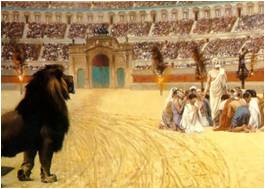 First and Second Peter are grouped in what are called the General Epistles, written to the Church at large. The theme of First Peter is the refining and growth potential in our sufferings, 1Pe 1:3, 1Pe 1:6; 1Pe 2:2. This epistle was written to believers scattered by persecution throughout Asia Minor (1 Pe 1:1). The date was circa 64-65 A.D.—the beginning of Nero’s persecutions. First Peter is the best known and loved of these epistles, called by E.J. Goodspeed, “One of the most moving pieces of persecution literature.” This epistle is written to suffering believers, and is styled by Isaac Walton as, “affectionate, loving, lowly, and humble.” This epistle conveys an intense expectation of the Lord’s return as seen in 1Pe 1:5, 1Pe 1:7, 1Pe 1:13, 1Pe 2:12, 1Pe 4:13, 1Pe 4:17, 1Pe 5:1, 1Pe 5:4.
First and Second Peter are grouped in what are called the General Epistles, written to the Church at large. The theme of First Peter is the refining and growth potential in our sufferings, 1Pe 1:3, 1Pe 1:6; 1Pe 2:2. This epistle was written to believers scattered by persecution throughout Asia Minor (1 Pe 1:1). The date was circa 64-65 A.D.—the beginning of Nero’s persecutions. First Peter is the best known and loved of these epistles, called by E.J. Goodspeed, “One of the most moving pieces of persecution literature.” This epistle is written to suffering believers, and is styled by Isaac Walton as, “affectionate, loving, lowly, and humble.” This epistle conveys an intense expectation of the Lord’s return as seen in 1Pe 1:5, 1Pe 1:7, 1Pe 1:13, 1Pe 2:12, 1Pe 4:13, 1Pe 4:17, 1Pe 5:1, 1Pe 5:4.
Gene Cunningham - May 23, 2000
Living Sacrifice 21
Scripture References: John 5:14-15, Romans 6:14, Isaiah 49:4, John 7:17, Romans 6:6, John 9:31, Romans 12:1, Isaiah 49:2, Luke 1:38, Romans 6:3, Ephesians 5:15, Romans 6:13-16, Hebrews 4:12, Exodus 3:4, Romans 6:15-23, Ephesians 5:17, Romans 4:3, Isaiah 49:1-3, Genesis 22:1, Romans 6:1-14, Jeremiah 29:13, Romans 6:11, Romans 6:19, Romans 5:20, Ephesians 5:10, Romans 6:6-12, Matthew 26:29-42, Galatians 5:1, Romans 6:16, John 9:1-41, Romans 6:9
From Series: "Living Sacrifice (1995)"
Romans 12 and specifically Rom 12:1-2 is a pivot point between the doctrinal section and application of the book. This series methodically uses this passage to outline aspects or doctrines of the christian life -- God's provision and our prospect. Our lives can be acceptable to God if we progress on the path He intends. Living Sacrifice presents 12 doctrines: (1) redeeming time; (2) standing (positional truth); (3) self-presentation - availability; (4) approval; (5) service; (6) provision; (7) spiritual warfare; (8) conformity; (9) spiritual advance; (10) renewal; (11) divine guidance; (12) abundant life.

